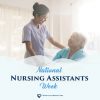National Nursing Assistants Week occurs in early June each year. Certified Nursing Assistants are imperative to the happiness and well-being of senior living residents. Here is a look at what CNAs do at Consulate Health Care communities:
Help with resident treatment plans
Each resident in our care has a treatment plan noting any health conditions the individual has, as well as any medications he or she is taking. CNAs work with clinical nurses to share information they notice about the senior, such as potential side effects from prescription medications, or worsening dementia. The observations that CNAs make on a daily basis are major contributions to resident treatment plans. These professionals work with other medical staff to ensure the seniors in their care are receiving the best possible treatment for any health troubles they have. CNAs may also look for burgeoning issues, like worsening eyesight or onset of Alzheimer’s disease or diabetes. Some patients may receive special monitoring, including daily or weekly evaluations to test their memory, for example. CNAs are a part of this process and offer in-depth knowledge that is invaluable to proper resident treatment.

Follow safety regulations
Senior living communities must follow many state and federal laws to offer the best possible care for their residents. CNAs are a major part of this, as they follow these regulations daily. Some CNAs watch over seniors residing in memory care who may wander and become confused. They also use and wear safety equipment, such as gloves while providing resident care, or utilizing lift mechanisms to help individuals who have limited mobility. CNAs are the heart of Consulate Health Care, making sure fellow medical staff and residents are safe and in good hands.
Performing necessary cleaning
CNAs don’t just provide direct resident care. These medical professionals are responsible for cleaning and disinfecting equipment. This ranges from sanitizing wheelchairs and other equipment residents use, to serving and cleaning up after between-meal snacks. Consulate Health Care residents also have other staff available to clean their units and address their laundry.
Engage in continued training
It’s incredibly important that CNAs participate in ongoing training sessions to continue their medical learning. CNAs must be certified to practice nursing in the state where they work, but also have to take courses on incidents that may involve possible exposure to blood or bodily fluids. They also must re-certify periodically, and sometimes gain extended training in working with older, less-mobile residents.
Accompanying residents to activities
CNAs may spend part of their days assisting seniors with going to activities and functions. Consulate Health Care communities have diverse life enrichment programs that provide entertainment to residents. Many seniors in our care also receive speech or physical rehabilitation, during which a CNA may accompany them. Our nurses may help seniors with mobility issues, such as pushing older individuals’ wheelchairs to the community room where games or other activities take place. CNAs often become friends with residents because they spend ample amounts of time together and offer compassionate care. In fact, many of our residents consider their CNAs family.
If you found an error, highlight it and press Shift + Enter or click here to inform us.



